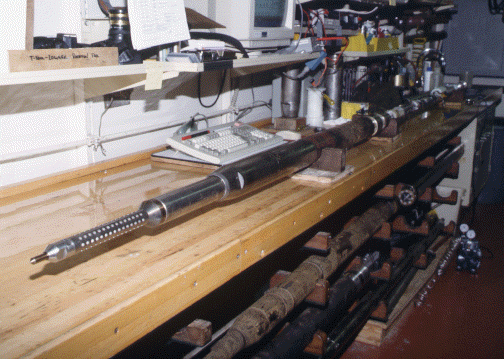 Two or three water-sampling temperature probes (WSTP) are routinely available for sampling fluids ahead of the bit in sediments soft enough for the probe to penetrate without cracking. The WSTP is run on the coring line between cores and therefore requires a break in coring and drilling operations (perhaps as long as 2-4 hours, depending on water and hole depth and measurement plan) to collect a sample. The probe lands in the bottom-hole assembly (BHA) so that it extends up to 1 m into the sediment ahead of the bit; thus, the sediment to be cored next is disturbed. Fluid is drawn into the sample chamber (by the contrast between ambient [hydrostatic] pressure in the formation and surface atmospheric pressure initially trapped in the sampling system) through a series of titanium and stainless steel filters, and through the end of a 1/16-in. titanium sampling tube mounted near the tip of the probe.
Two or three water-sampling temperature probes (WSTP) are routinely available for sampling fluids ahead of the bit in sediments soft enough for the probe to penetrate without cracking. The WSTP is run on the coring line between cores and therefore requires a break in coring and drilling operations (perhaps as long as 2-4 hours, depending on water and hole depth and measurement plan) to collect a sample. The probe lands in the bottom-hole assembly (BHA) so that it extends up to 1 m into the sediment ahead of the bit; thus, the sediment to be cored next is disturbed. Fluid is drawn into the sample chamber (by the contrast between ambient [hydrostatic] pressure in the formation and surface atmospheric pressure initially trapped in the sampling system) through a series of titanium and stainless steel filters, and through the end of a 1/16-in. titanium sampling tube mounted near the tip of the probe.
In open hole, the WSTP also can be used to sample borehole fluids ahead of the bit. In addition, Schlumberger tools for sampling open-hole fluids may be available through LDEO.
For more information, see the following sections of Technical Note 10: